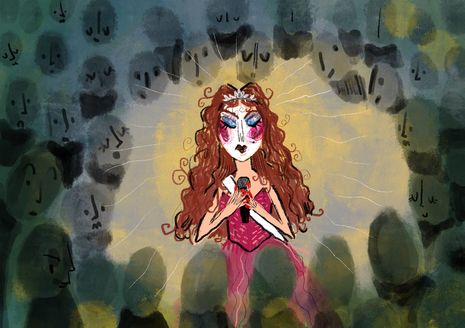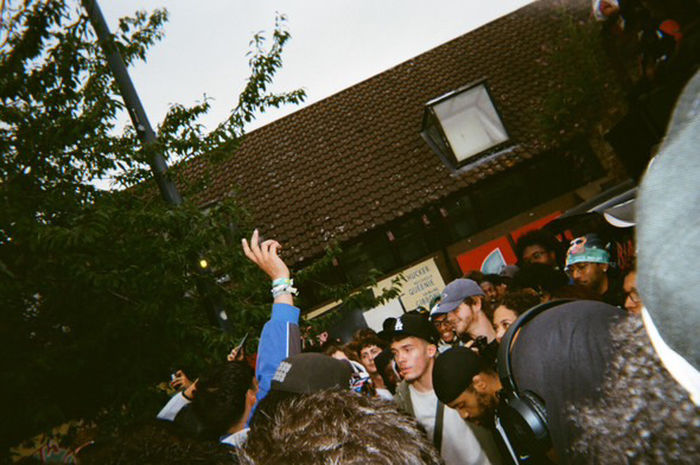Pop music and the pendulum of irony
From the sincere to the ironic, Tia Ribbo examines the extremes that women in pop are dealt

Chappell Roan’s new single ‘The Subway’ is, as one Pitchfork critic aptly put it, dessert for “gay sadsacks” everywhere. Backed by refreshingly gentle instrumentation, Roan returns to lyrically familiar ground: each line drips with sexual innuendo, tongue-in-cheek jests, and, of course, excruciatingly palpable heartbreak. Her long-awaited outro belt of “she got away” is agonising, a lover’s grief strung out in every high note. Since my first listen, it’s become addictive. I find myself turning to it on the bus, skipping to it while cooking. Roan has ensnared me with her hushed pre-chorus sadness, her 90s-style guitar, and – above all – her distinctly indie-pop sincerity.
Sincere emotion is not something Chappell Roan has ever avoided; her first album The Rise and Fall of a Midwest Princess overflows with it. She buries her sexual desperation under cheerleader battle cries in ‘Hot to Go,’ and rubs her wounds over the pulsing synths in ‘Casual’. At times she turns to no-strings sexual frivolity (‘Red Wine Supernova’), but still fails to disguise the longing beneath the laughter.
“Love and attraction took centre stage, but there was no depth to it, no honesty”
‘The Subway’ is no different. Enhanced by the track’s nostalgia-drenched fusion of The Cranberries/The Sundays-esque guitar, this single shows Roan at her most pensive. Jangling chords and soft harmonies remind us of those artists who sang so wistfully about love (“I hope I never wake / When I’m thinking about you”) and loss (“Were you lying all the time? / Was it just a game to you?”). ‘The Subway’ latches intentionally onto these associations, letting us know that Chappell Roan remains as gut-wrenchingly sincere as ever.
And she’s not the only one.
Beabadoobee, Pinkpantheress, Clairo: all three exemplify the emergent class of young, female songwriters who toe the line between indie music’s emotional overtures and the catchy nothingness of pop. Beabadoobee’s This is How Tomorrow Moves may lack the naive charm of her earlier, more saccharine hits, but her honesty remains. Pinkpantheress may grow bolder (“You want sex with me? / Come talk to me”) but no less emotionally earnest (“When you’re not there / I feel emotionally out of a job”). And I’m sure we all know how enduringly sentimental Clairo can be (“You make me wanna go dancing / try on feminine”). These women never shy away from their desires, their fears, or their heartbreaks.
This sincerity is nothing new. Music critic Kris Song argues that, in music – pop especially – irony is cyclical. The 2010s made a claim to sincerity that didn’t quite fit: think Carly Rae Jepsen’s ‘Call Me Maybe’ and its honey-sweet but ridiculously inane phrases (“before you came into my life I missed you so bad”); Katy Perry’s mid-twenties Teenage Dreams; and Justin Bieber soliciting any Belieber to imagine herself as his girlfriend in, well, ‘Girlfriend’. Love and attraction took centre stage, but there was no depth to it, no honesty.
“Too much sincerity is cloying; too much irony is bitter”
Now, it seems the pendulum is malfunctioning. Only two months ago, Addison Rae’s debut album Addison took the internet by the throat. Clips of Rae’s performances feature her lingere-clad and slinking around a dusky stage as she cracks her whispery-soft vocals like a velvet whip. Critics can’t seem to determine whether this is Rae’s true form or yet another performance, as she affects a nonchalant pop star homage to Madonna, Brittney, and Janet Jackson. Rae seems to relish in that irony-laden middle-ground between real and fake. And last summer saw Charli XCX catapult onto centre stage with Brat. Her image is impenetrably cool, icy, and ironic. These pop stars, as opposed to the aforementioned indie-pop darlings, are lauded as representatives of our current cultural moment in all its nostalgic, self-referential glory.
Though Charli’s music is often as hedonistic and ironic as her image, there are standout moments of sincerity which threaten to turn the tide: ‘Girl So Confusing,’ for instance, or the melancholic ‘party 4 u’. Addison, too, dips from her cool, unaffected persona briefly in ‘Headphones On,’ but this is only a 2-minute chink in the facade. For this faction of self-conscious pop stars, real feelings are only briefly touched before they retract their fingers, burned by the flames of sincerity. The list does not end with these two, either: Lana Del Rey, Sabrina Carpenter – irony’s dutiful pop soldiers march on.
Both battalions of pop girlies (ironic and sincere) have attracted criticism. The ironic set are charged with being fake, derivative, and trying too hard; their indie-pop-darling counterparts, on the other hand, are condemned as cheesy, trivial, over-emotional, and overwrought. But such critique is a disservice to pop music and its potential. Too much sincerity is cloying; too much irony is bitter. The current roster of pop women strike a perfect balance, with ‘The Subway’ and the like making room for honesty and vulnerability in what is typically a highly-manufactured genre, for highly-manufactured images of women. This new party of indie-pop starlets hits a little deeper: they’re messily scrawled, more honest, and less contrived.
 News / Deborah Prentice overtaken as highest-paid Russell Group VC2 February 2026
News / Deborah Prentice overtaken as highest-paid Russell Group VC2 February 2026 News / Christ’s announces toned-down ‘soirée’ in place of May Ball3 February 2026
News / Christ’s announces toned-down ‘soirée’ in place of May Ball3 February 2026 Fashion / A guide to Cambridge’s second-hand scene2 February 2026
Fashion / A guide to Cambridge’s second-hand scene2 February 2026 News / Downing Bar dodges college takeover31 January 2026
News / Downing Bar dodges college takeover31 January 2026 Comment / Men at Cambridge are experiencing equality2 February 2026
Comment / Men at Cambridge are experiencing equality2 February 2026










